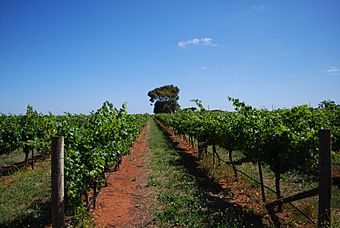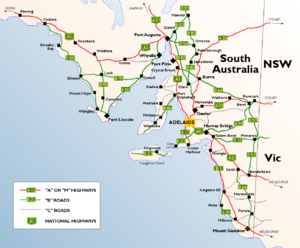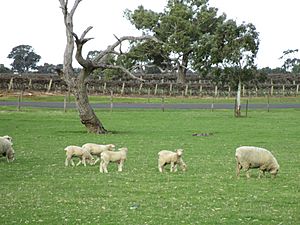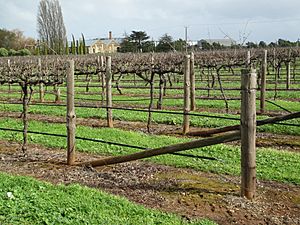Coonawarra wine region facts for kids
| Wine region | |
 |
|
| Type | Australian Geographical Indication |
|---|---|
| Year established | 2003 |
| Years of wine industry | established 1890 |
| Country | Australia |
| Part of | Limestone Coast zone |
| Growing season | October – April |
| Climate region | ’I’ |
| Heat units | 1392 |
| Precipitation (annual average) | 230 mm (9.1 in) |
| Size of planted vineyards | 5,603 hectares (13,850 acres) |
| No. of vineyards | 130 (2011) |
| Grapes produced | 23,480 tonnes (23,110 long tons; 25,880 short tons) |
| Varietals produced | Cabernet Sauvignon, Shiraz, Merlot, Chardonnay |
| No. of wineries | 28 |
| Comments | climate data – 2011, production -2012 & 2014 |
The Coonawarra wine region is a special area in South Australia. It is famous for its delicious wines. This region is known for its unique red soil, called "terra rossa". This soil helps grow amazing Cabernet Sauvignon grapes.
The name Coonawarra comes from an Aboriginal word. It means "Honeysuckle". The region is about 380 kilometers (236 miles) southeast of Adelaide. It is also very close to the border with Victoria.
Contents
History of Coonawarra Wines
The very first grapevines were planted here in 1890. A person named John Riddoch started this at a place called Yallum. For a long time, only the Redman family kept making wine. They mostly grew a grape called Shiraz.
Things changed a lot in 1951. A man named Samuel Wynn saw how special the red soil was. He bought the old Riddoch cellars. Soon, wineries like Wynns and Penfolds became very important. They helped change the Australian wine industry. Before, Australia mostly made sweet, strong wines. But then, they started making more regular table wines.
The Special Red Soil of Coonawarra
Coonawarra has a very famous type of soil. It is called "terra rossa". This soil is bright red. It is only found in a narrow strip, about 15 kilometers (9 miles) long and 2 kilometers (1.2 miles) wide. This special soil sits on top of a shallow limestone ridge.
This ridge is a bit higher than the wet, swampy land around it. This is why the Riddoch Highway was built along this ridge. People used to look for the firmest ground to travel on. You can even see this special red soil clearly from an aerial photo.
Some areas near the ridge have different soils. For example, to the west, there is black soil. This soil does not drain water well. So, it is not good for growing grapevines. There is also a "transitional" brown soil. This soil can grow vines quite well.
Coonawarra's Climate
Coonawarra is only about 60 kilometers (37 miles) from the sea. This means it has a climate similar to places like Bordeaux in France. The weather is influenced by the ocean.
During the growing season (October to April), there is not much rain. Only about 219 millimeters (8.6 inches) of rain falls then. The total rainfall for the year is about 585 millimeters (23 inches). Lots of clouds help keep the temperature down. In January, the average temperature is around 19.1 °C (66.4 °F).
Popular Grape Varieties
Coonawarra is most famous for its Cabernet Sauvignon grapes. These grapes make wines that taste like plum and blackcurrant. But other grapes also grow very well here.
In the past, Shiraz was the most common grape. It still makes some amazing wines today. One example is Wynns Coonawarra Estate Michael Shiraz. The limestone soil is also great for growing Chardonnay, Riesling, and Sauvignon blanc grapes.
Wineries in Coonawarra
The wineries in Coonawarra work together. They have an organization called the Coonawarra Vignerons Association. Many wineries have "cellar doors" where you can visit and taste wines.
One well-known winery is Wynns Coonawarra Estate. Other famous wineries also use grapes from Coonawarra. These include Yalumba and Penfolds.
 | Kyle Baker |
 | Joseph Yoakum |
 | Laura Wheeler Waring |
 | Henry Ossawa Tanner |




